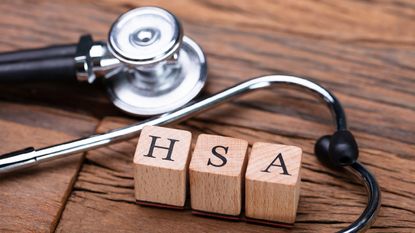How Your HSA Can Reimburse You for Medicare Premiums Paid
Even if your Medicare premiums are automatically deducted from your Social Security check, you can take tax-free withdrawals from an HSA to reimburse yourself.


Question: You told another reader that people can’t make new contributions to a health savings account once they enroll in Medicare, but they can withdraw the money tax-free from the account to pay Medicare premiums. If I have my Medicare payments deducted directly from my Social Security benefits, can I still withdraw money from my HSA for those expenses? And do I need to withdraw the money right away, or can I keep the money growing in the HSA and withdraw it for those premiums sometime in the future?
Answer: Even though you have your Medicare premiums paid directly out of your Social Security benefits, you can withdraw money tax-free from your HSA to reimburse yourself for those expenses. After you turn 65, you can use HSA money tax-free to pay premiums for Medicare parts B and D and Medicare Advantage plans (but not premiums for Medicare supplement policies), in addition to paying for other out-of-pocket medical expenses.
And there’s no time limit for withdrawing money from an HSA to pay for those expenses. You can keep the money growing tax-deferred in the account, then withdraw it tax-free at any time in the future to reimburse yourself for any eligible expenses you have incurred since you opened the HSA. So if you’ve had an HSA for several years and didn’t realize you could withdraw money tax-free for Medicare premiums, you could reimburse yourself for all of those premiums at any time. You just need to keep receipts showing that you paid for eligible expenses. And you can’t withdraw money for expenses you incurred before you opened up the HSA. “When reimbursing himself from the HSA, it’s important that he maintains proof of payment and documentation that the expenses were eligible, in the event of an audit (although he does not need to submit any receipts to be reimbursed),” says Begonya Klumb, head of HSAs for Fidelity Health Care Group.

Sign up for Kiplinger’s Free E-Newsletters
Profit and prosper with the best of expert advice on investing, taxes, retirement, personal finance and more - straight to your e-mail.
Profit and prosper with the best of expert advice - straight to your e-mail.
For more information about HSA-eligible expenses, see IRS Publication 969, Health Savings Accounts. Also see 10 Myths About Health Savings Accounts for more information about how these accounts work.
Related Content

As the "Ask Kim" columnist for Kiplinger's Personal Finance, Lankford receives hundreds of personal finance questions from readers every month. She is the author of Rescue Your Financial Life (McGraw-Hill, 2003), The Insurance Maze: How You Can Save Money on Insurance -- and Still Get the Coverage You Need (Kaplan, 2006), Kiplinger's Ask Kim for Money Smart Solutions (Kaplan, 2007) and The Kiplinger/BBB Personal Finance Guide for Military Families. She is frequently featured as a financial expert on television and radio, including NBC's Today Show, CNN, CNBC and National Public Radio.
- Donna LeValleyPersonal Finance Writer
-
 Strategies to Optimize Your Social Security Benefits
Strategies to Optimize Your Social Security BenefitsTo maximize what you can collect, it’s crucial to know when you can file, how delaying filing affects your checks and the income limit if you’re still working.
By Jason “JB” Beckett Published
-
 Don’t Forget to Update Beneficiaries After a Gray Divorce
Don’t Forget to Update Beneficiaries After a Gray DivorceSome states automatically revoke a former spouse as a beneficiary on some accounts. Waivers can be used, too. Best not to leave it up to your state, though.
By Andrew Hatherley, CDFA®, CRPC® Published
-
 Getting Out of an RMD Penalty
Getting Out of an RMD Penaltyretirement When your brokerage firm miscalculates your required minimum distributions, you have recourse.
By Kimberly Lankford Published
-
 Borrowers Get More Time to Repay 401(k) Loans
Borrowers Get More Time to Repay 401(k) Loansretirement If you leave your job while you have an outstanding 401(k) loan, Uncle Sam now gives you extra time to repay it -- thanks to the new tax law.
By Kimberly Lankford Published
-
 It’s Not Too Late to Boost Retirement Savings for 2018
It’s Not Too Late to Boost Retirement Savings for 2018retirement Some retirement accounts will accept contributions for 2018 up until the April tax deadline.
By Kimberly Lankford Published
-
 How to Correct a Mistake on Your RMDs from IRAs
How to Correct a Mistake on Your RMDs from IRAsretirement If you didn't take out the correct required minimum distribution because your brokerage firm made a mistake, the IRS may show some leniency.
By Kimberly Lankford Published
-
 Making the Most of a Health Savings Account Once You Turn Age 65
Making the Most of a Health Savings Account Once You Turn Age 65Making Your Money Last You’ll face a stiff penalty and taxes if you tap your health savings account for non-medical expenses before the age of 65. After that, the rules change.
By Kimberly Lankford Published
-
 Reporting Charitable IRA Distributions on Tax Returns Can Be Confusing
Reporting Charitable IRA Distributions on Tax Returns Can Be ConfusingIRAs Taxpayers need to be careful when reporting charitable gifts from their IRA on their tax returns, or they may end up overpaying Uncle Sam.
By Kimberly Lankford Published
-
 Make the Most of the New Military Retirement Plan
Make the Most of the New Military Retirement Planretirement The government is offering a new retirement option so that service members who leave the military before qualifying for a pension can still receive some benefits.
By Kimberly Lankford Published
-
 How Changes in Income Affect Medicare Premiums
How Changes in Income Affect Medicare PremiumsMedicare Medicare beneficiaries can see their premiums go up if their income rises, although for some that increase will be only temporary.
By Kimberly Lankford Published